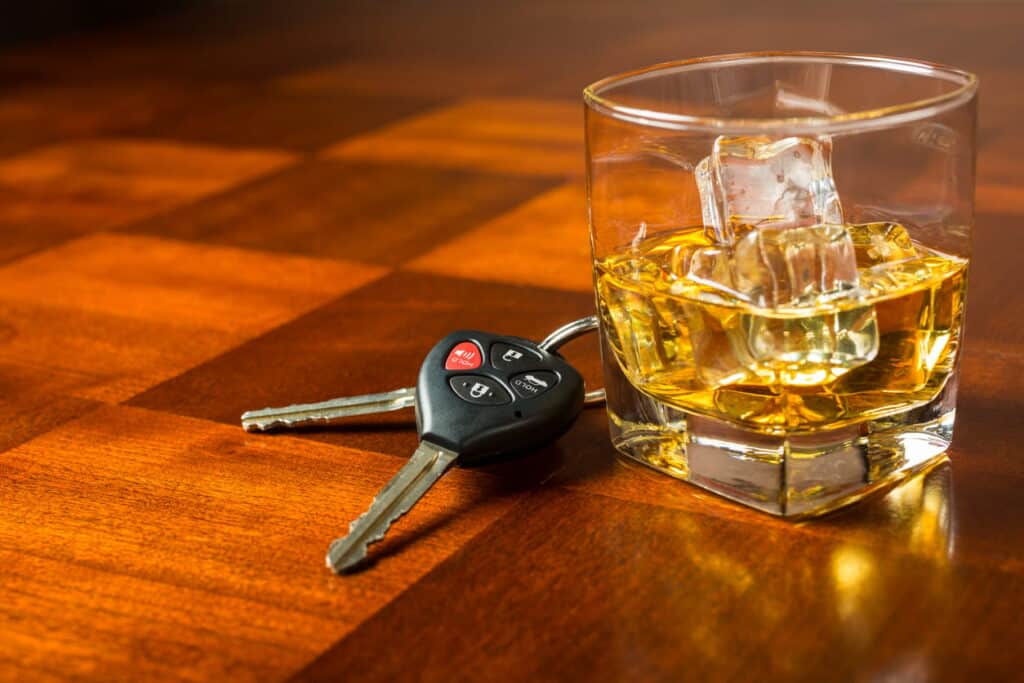Blood Alcohol Content and Drunk Driving Explained

Driving while drunk — also known as driving under the influence (DUI) — in the state of Florida, has serious consequences. If you cause a vehicle accident where people are seriously injured or killed, and you are found to have an over-the-limit blood alcohol content, you could face severe penalties, possible jail time, and lose your future ability to drive.
Bernstein & Maryanoff Injury Attorneys is here to help you understand Florida’s drunk driving laws. Contact us today if you need an experienced Miami drunk driver crash attorney.
What is blood alcohol content related to drunk driving?
Intoxication occurs when a person has ingested alcohol by drinking beer, wine, or distilled spirits. The more a person ingests, the more intoxicated they become. The rate at which a body processes alcohol through the liver is what causes drunkenness.
For example, most people can process eight ounces of alcohol in an hour. That means you will not necessarily be drunk if you only have one drink and let it process out of your system. It also depends on your weight and health condition and other factors, such as whether you also ate food.
Once you have consumed too much alcohol, you will become physically and mentally impaired, which is legally defined as the inability to function normally in terms of focus, concentration, speech, and behavior. That constitutes a drunk condition and is verified through a blood alcohol content test. A person who is drunk cannot make sound judgments when operating a vehicle and, in turn, poses a serious risk to themselves and other drivers on the road.
NO FEES UNLESS WE WIN
Protecting Your Rights Since 1983
Contact Bernstein & Maryanoff Injury Attorneys today and get a free legal consultation regarding your car crash.
Hablamos Español
What is the legal alcohol limit in Florida?
In Florida, a blood alcohol content (BAC) at or over 0.08% is considered legally drunk. People might wonder what blood alcohol level is safe, and while, technically, a BAC under .08 is not drunk, it is not safe either. Alcohol has different effects on different people.
How are blood alcohol levels tested in the state of Florida?
Every time you drive a vehicle in Florida, you are under what is called the Implied Consent Law, which means you can be tested for alcohol intoxication. There are three types of tests to determine drunk driving:
- Breathalyzer
- Blood test
- Urine test
When you are involved in a vehicle accident, the police officers on the scene can test you on the spot with a breathalyzer. The test consists of a device that the suspected drunk driver puts their mouth on and blows air to register and record the blood alcohol limit. Note that if a police officer suspects you are drunk, they can ask you to take the test. You can opt to decline, but under Florida laws, you would lose your license for one year or more.
Another scenario could be that you are injured in a vehicle accident where you were the driver. You are sent to the hospital and could have your blood drawn in an ambulance or when you arrive. Your BAC will be determined at that time.
Could you refuse a blood test? Yes, but the consequences are losing your driver’s license, paying fines, and possibly facing jail time.
What are Florida’s drunk driving laws?
Florida’s drunk driving laws are regulated by the number of offenses committed. If you are caught more than once for drunk driving, the penalties go up considerably.
The details involved in a drunk driving car crash also determine the punishment severity. If your BAC is .15 or a minor is involved, your charges will be labeled as aggravated, raising your penalties higher and you would have an ignition interlocking device (IID) placed on your auto for 6-24 months. The vehicle won’t start until a driver breathes into the IID breathalyzer to record the BAC level.
First offense: If convicted, you could face 6 to 9 months in jail, $500 to $2,000 in fines, and license revocation of 180 days to one year.
Second offense: If convicted, you could face 9 to 12 months in jail, $1,000 to $4,000 in fines, and license revocation of 180 days to one year.
Third offense: If your prior convictions were in the past ten years or more, you would be charged with a misdemeanor offense. If your prior offense were within ten years, you would be charged with a 3rd-degree felony. You are put in jail immediately for 30 days minimum and face up to 5 years total in prison. Fines range from $2,000 to $5,000. License revocation is up to 10 years.
Related: Is Drunk Driving a Felony?
Florida drunk driving laws are severe

A person’s blood alcohol level and drunk driving in Florida pose a life-altering risk. The consequences of a terrible car accident with injury to yourself or others lead to permanent negative consequences. This information is intended to deter people from drinking and driving in the first place. Whether you have caused or been the victim of a drunk driving accident in Florida, contact the experienced attorneys at Bernstein & Maryanoff Injury Attorneys to learn about your rights and options.
NO FEES UNLESS WE WIN
Protecting Your Rights Since 1983
Were you injured in a drunk driving accident? Contact Bernstein & Maryanoff Injury Attorneys now.
Hablamos Español
Sources:
FLA. STAT. § 316.193
FLA. STAT. § 316.1932
Florida DUI and Administrative Suspension Laws. (2023).
About the Author

Jack G. Bernstein, ESQ.
Jack Bernstein is a hard-working and highly motivated personal injury attorney in Miami, Florida with over three decades of experience. He is a strategist and idea person, with a genuine passion for helping his firm’s clients. If you’ve been injured, contact Jack Bernstein today for a free evaluation of your case.
